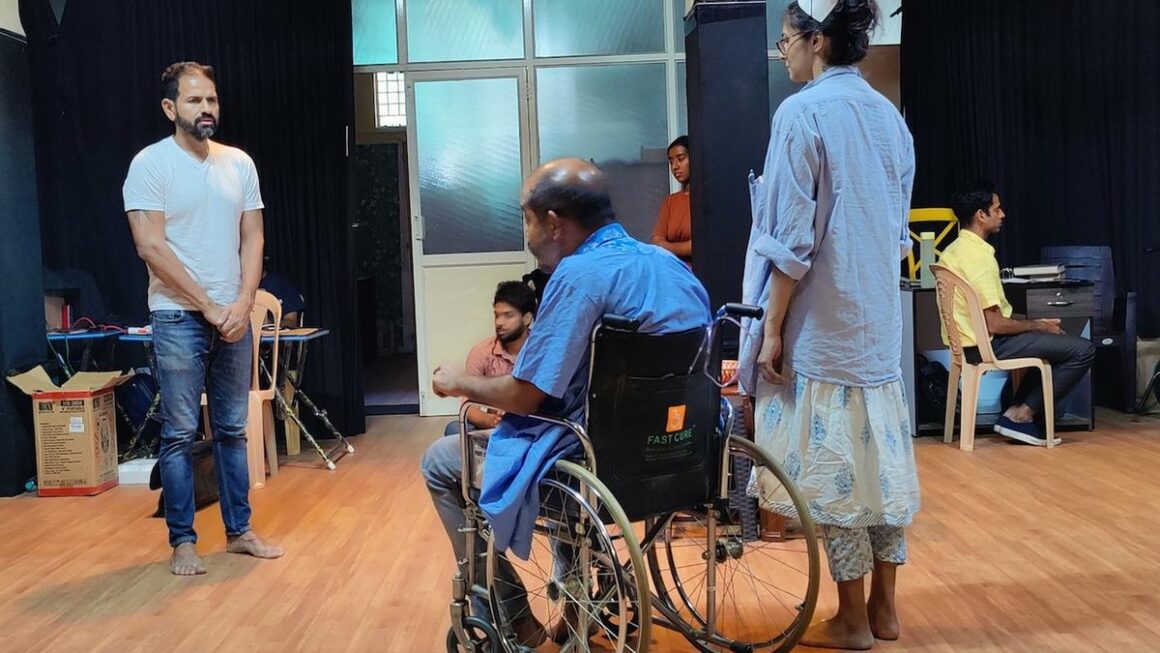
A still from Innocence
| Photo Credit: Special Arrangement
Imagine a world where Franz Kafka’s absurdism intersects with modern India’s vibrant chaos. A world where an innocent man fights a desperate battle for justice against a system designed to silence him. This is the world of Innocence, a black comedy written and directed by Anmol Vellani, premiering in Bengaluru on May 10.
Innocence draws inspiration from Kafka’s iconic novel The Trial, transposing its timeless struggle for justice to the realities of 21st-century India. As Anmol explains, “It’s an adaptation in two ways: first, by transposing the story to contemporary India, and second, by translating it from a novel to a theatrical performance.”
The play tells the story of an unnamed protagonist who finds himself inexplicably accused of a crime whose nature remains shrouded in mystery. As he navigates a labyrinthine legal system, his unwavering insistence on his innocence leads him down a path of despair and isolation.
There are inherent difficulties in adapting Kafka’s work, Anmol acknowledges. i “Adapting The Trial presented unique challenges. The novel relies heavily on long, descriptive passages to create dread and terror, which are difficult to translate directly onto the stage with minimal dialogue.” His task was transforming it into scenes filled with interaction, conflict, and dramatic tension.
Preserving the core themes and character dynamics was paramount for Anmol. Condensing a 200-page novel required cuts and additions, but its essence had to be retained. Kafka’s factual, report-like prose, despite its absurdity, posed a challenge: what theatrical style best reflected this?
Black comedy emerged as the answer. “It allowed characters to behave normally, mirroring Kafka’s prose while highlighting the underlying abnormality of their situation. The black humour aligns perfectly with what Kafka conveys in the novel, delivering a serious message through a seemingly lighthearted lens,” Anmol explains.
While the play delves into the absurd, it also carries a strong undercurrent of social commentary. Anmol carefully incorporates references to contemporary Indian political events, including the questionable electoral bonds scheme. He acknowledges, “These absurdities were everywhere. As I wrote the play, starting in 2017, I kept incorporating these contemporary Indian references, but with caution.”
This cautious approach ensures that the play’s core themes remain universally relevant while resonating deeply with Indian audiences familiar with these recent events.
“The play’s political elements are quite explicit,” says the director. The dialogue directly references existing issues in the country, albeit in a humorous way. “While it doesn’t delve deeply into the underlying issues, it makes clear references to various events, including the infamous case of a judge’s sexual misconduct that led to his recusal from the Indian judiciary. The play doesn’t explicitly name individuals. However, these references are clear and impactful for those familiar with recent events in India.”
At a time when creators in mainstream cinema and OTT platforms face restrictions, Anmol is hardly worried about referring to contemporary socio-political events. “The smaller audience size inherent to theatre offers certain advantages,” he says, “When the audience is large, the government gets worried because then you have a real influence. I can function under the radar with a smaller audience without worrying about recovering costs. Forget about the political implications altogether.”
This freedom allows for a more nuanced and potentially critical exploration of sensitive themes, making Innocence a potentially thought-provoking production.
‘Innocence’, presented by Toto Funds the Arts, will be staged at Goethe-Institut/Max Mueller Bhavan Bangalore from May 10 to 12 at 7pm. Tickets on bookmyshow.com.
Published – May 11, 2024 12:16 am IST


Leave a Reply